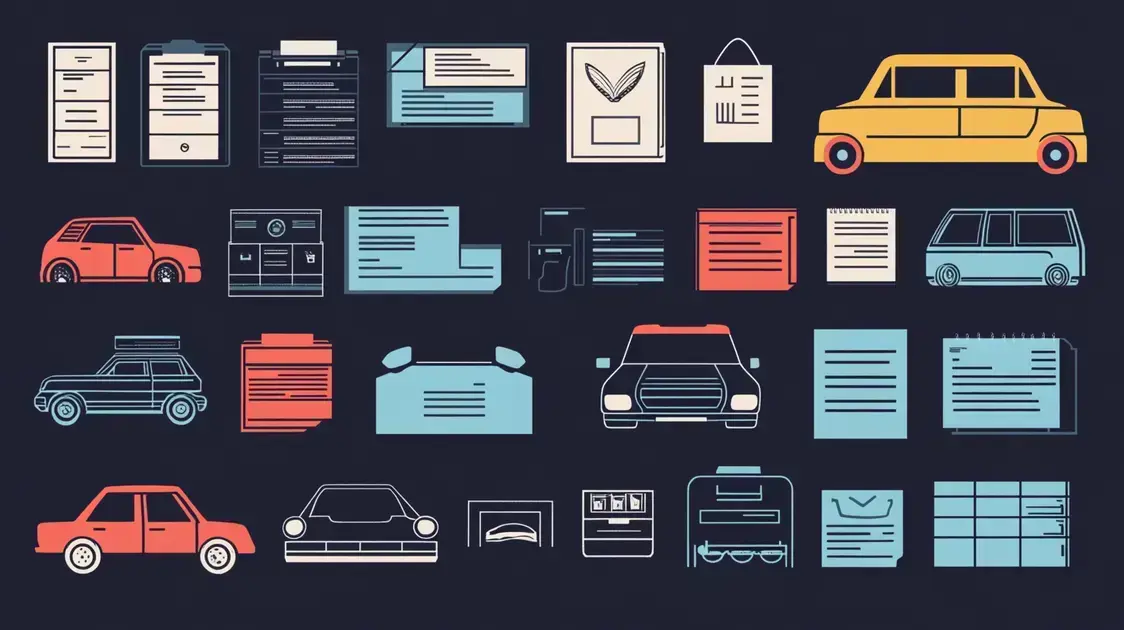Many individuals question, does my personal auto insurance cover business use? It’s a critical concern for those who blend personal and business driving.
Understanding the nuances of auto insurance can save you both money and hassle down the road. In this article, we’ll uncover what personal auto insurance typically covers and what exceptions may apply, ensuring you’re prepared for any situation that arises.
Understanding Personal Auto Insurance
Personal auto insurance is designed mainly for everyday drivers. It covers your vehicle when you use it for personal purposes, like commuting or running errands. Generally, it protects you against damages resulting from accidents, theft, or fire.
Types of Coverage
There are various components to personal auto insurance:
- Liability Coverage: This helps cover costs if you cause injury or damage to someone else.
- Collision Coverage: This covers damage to your vehicle from collisions, regardless of who is at fault.
- Comprehensive Coverage: This protects against non-collision-related damages, such as theft or vandalism.
- Personal Injury Protection (PIP): This covers medical expenses for you and your passengers, no matter who caused the accident.
Understanding these components can help you determine if your personal auto insurance meets your needs. Recognizing the limits of your policy is essential, especially regarding business activities. A common question drivers ask is: does my personal auto insurance cover business use? Knowing the answer can help avoid unexpected expenses in case of an accident.
Key Features to Understand
It’s also important to note that personal auto insurance policies have specific limits regarding coverage. For instance, if you use your vehicle primarily for business purposes, your personal auto insurance might not cover accidents that happen during business use.
If you’re wondering, does my personal auto insurance cover business use, it’s best to review your policy and consult your provider to ensure you have the right protection.
Ultimately, knowing the details of your personal auto insurance can help you decide what additional coverage you may need when using your vehicle for business. The goal is to make sure you’re protected in any situation that may arise while on the road.
Business Use Defined
Examples of Business Use
Here are several common scenarios that qualify as business use:
- Client Meetings: Driving to meet clients or customers at their location.
- Deliveries: Using your vehicle to deliver products or documents relevant to your business.
- Business errands: Running small errands like picking up office supplies or visiting suppliers.
- Traveling Between Job Sites: If you’re a contractor or worker, traveling between different job locations counts as business use.
Why It Matters
Understanding business use matters because personal auto insurance may not cover accidents or damages that occur while using your vehicle for business tasks. If you’re frequently using your car for work, it’s essential to reevaluate your insurance policy to ensure you have the proper coverage.
If you’re asking yourself, does my personal auto insurance cover business use, consulting your insurance provider is the best way to confirm whether additional coverage is needed. Being aware of what constitutes business use can help you make informed choices about your insurance, avoiding potential gaps in coverage that may leave you vulnerable.
Is Coverage Automatically Included?

Many people wonder, is coverage automatically included in their personal auto insurance policy for business use? The answer varies depending on the insurance provider and the specific policy you have.
Typical Personal Auto Insurance Policies
Most standard personal auto insurance policies do not automatically include coverage for business use. This is important to know because if you use your vehicle for business-related activities, it might leave you without the necessary protection.
When Coverage Might Be Included
Some insurance companies may offer limited coverage for occasional business use without additional charges. However, this usually depends on the nature of the business activities and the frequency of use. Always check with your insurer to confirm what your policy includes.
Exceptions
It’s crucial to understand exceptions in your policy. For example, if you regularly use your vehicle for business purposes, you typically need a special endorsement or a commercial policy to ensure full coverage. Using your personal vehicle for business tasks frequently can lead to claims being denied if they fall outside your policy’s specified terms.
Each insurer has its own rules regarding business use, making it essential to read your policy carefully and ask questions if you’re unsure about your coverage.
Common Exceptions in Auto Insurance
When it comes to auto insurance, understanding common exceptions is vital for effective coverage. Not every situation will be covered under typical personal auto insurance policies. A key question many drivers have is, does my personal auto insurance cover business use? The answer depends on the specifics of your policy and how you use your vehicle.
Exclusions for Business Use
If you use your vehicle regularly for business purposes, it can lead to exclusions in your coverage. Most personal auto insurance providers will not cover damages that occur while using your vehicle for work-related activities if you haven’t reported it.
Before assuming you’re covered, it’s important to ask, does my personal auto insurance cover business use? Reviewing your policy or consulting your insurer can help clarify your coverage.
Racing or Illegal Activities
Another common exception is coverage related to racing or engaging in illegal activities. If an incident occurs while you’re participating in a race or illegal driving activities, your policy will most likely not cover any resulting damages or injuries.
Unauthorized Drivers
Using your vehicle with unauthorized drivers can also result in a lack of coverage. If someone other than you is driving and they are not listed on your policy, your insurer may refuse to pay for damages if an accident happens.
Carrying Passengers for a Fee
Carrying passengers for a fee is often not covered under personal auto insurance. For example, if you drive for rideshare services, your standard policy may not provide coverage in case of an accident.
Commercial Activity Exclusions
Frequent commercial activities using your personal vehicle can lead to significant coverage gaps. If your policy states that business use is not included, you should consider purchasing a commercial auto insurance policy to ensure proper protection.
Being aware of these exceptions can help prevent surprises and ensure that you have the right insurance coverage for your needs. Always review your policy details and consult your insurance agent for clarification.
How to Add Business Use Coverage
If you find yourself needing to add business use coverage to your auto insurance, here are some steps to guide you through the process:
1. Assess Your Needs
Start by identifying how often and for what purposes you use your vehicle for business. Understanding your specific needs will help you communicate effectively with your insurance agent.
2. Review Your Current Policy
Look at your existing policy to see what coverage you currently have. Understanding your current limits, exclusions, and conditions will give you a clearer picture of what needs to be changed.
3. Contact Your Insurance Agent
The next step is to get in touch with your insurance agent or provider. Explain that you need to add business use coverage. They can provide information on options and any additional costs involved.
4. Discuss Options and Add-Ons
Your insurance provider may offer different options for adding coverage. Some might provide a simple endorsement to your current policy, while others may suggest a separate commercial policy. Make sure you understand the differences.
5. Get a Quote
Request a quote reflecting the new coverage. This will help you compare how much more you will be paying and whether it’s worth it for your situation. Make sure the quote includes all benefits and limitations related to the business use coverage.
6. Make Changes to Your Policy
Once you’ve decided on the right option, finalize the paperwork to update your policy. This may involve signing documents and making the first payment for the added coverage.
7. Keep Records
After the changes are made, keep a copy of your updated policy and any communications with your insurer. This will serve as proof of your coverage should you need it in the future.
Comparing Personal vs. Commercial Insurance

When deciding between personal and commercial insurance, it’s essential to understand the key differences between the two. Each type serves distinct purposes based on how you use your vehicle. A common question many drivers ask is, does my personal auto insurance cover business use? Understanding your policy details can help ensure you have the right coverage.
Definition
Personal Insurance covers vehicles used primarily for personal activities, like commuting or running errands. This type of insurance is designed for everyday drivers.
Commercial Insurance is specialized for vehicles used for business purposes. It covers professional drivers and vehicles that transport goods or carry passengers for a fee.
Coverage Differences
Personal insurance usually includes liability, collision, and comprehensive coverage. However, it may not cover damages incurred during business-related use. If you’re wondering, does my personal auto insurance cover business use, it’s crucial to check your policy details. In contrast, commercial insurance often provides broader coverage, including:
- Higher Liability Limits: This is crucial for businesses that may face larger claims.
- Business-related Uses: It ensures that you’re covered while using your vehicle for work.
- Employee Coverage: For businesses with multiple drivers, commercial insurance can cover all employees driving company vehicles.
Cost Considerations
Generally, personal auto insurance tends to be cheaper than commercial insurance. This is because personal policies have lower limits and risks associated with typical driving behaviors. Commercial policies, however, reflect the increased risks and higher liability involved in business activities, leading to higher premiums.
Policy Flexibility
Personal insurance is often less flexible in terms of additional coverages and options compared to commercial insurance. Commercial policies allow businesses to tailor coverage based on their specific needs, like adding coverage for specialized vehicles or tools carried in the vehicle.
Making the right choice between personal and commercial insurance is vital for ensuring you’re properly covered while driving for work or personal activities. Always consider your driving habits and consult with your insurance agent.
Conclusion and Next Steps
This article discussed important aspects of whether does my personal auto insurance cover business use. It highlighted the need to understand the differences between personal and commercial insurance, analyzed scenarios, and identified when additional coverage is necessary.
What to Do Next
If you use your vehicle for business, take these steps:
- Review Your Current Policy: Check your existing auto insurance policy carefully. Determine what is covered and what isn’t.
- Understand Your Business Use: Clearly define how often and for what purposes you use your vehicle for work. This information will help you discuss your needs with your insurer.
- Speak to Your Insurance Agent: Consult with your insurance agent or provider about adding business use coverage. They can provide options tailored to your situation.
- Get a Quote: Request quotes for necessary coverage types. Make sure you understand each option’s features and limitations.
- Consider Commercial Insurance: If your business use is extensive, investigate whether a commercial auto insurance policy would be a better fit for your needs.
By taking these steps, you can ensure that you are adequately covered while using your vehicle for work-related activities. Staying informed will help protect yourself against potential financial losses due to accidents while on the job.